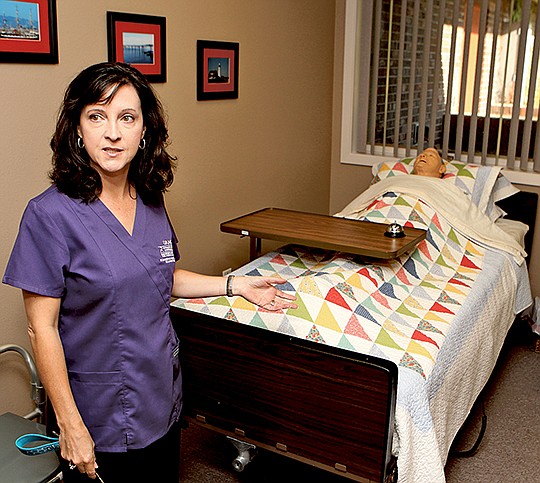A multimillion dollar grant from the Donald W. Reynolds Foundation to the Schmieding Home Caregiver Training project will enable the organization to continue its programs, Valerie Claar, coordinator for Home Caregiver Training in Hot Springs, said Thursday.
"We're so appreciative of the grant money, and to be able to continue what we're doing. In Garland County, we know that 21.3 percent of the population is over 65 years of age, compared to the statewide average of 15.4 percent.
"We know that Garland County has a heavier population of elderly people and that creates a tremendous need for care givers to take care of people as they age. We know people want to stay at home and they do well when they are in a home setting," said Claar, who has been with Schmieding since July, a nurse educator for eight years, and a nurse for 20 years.
Claar said the Donald W. Reynolds Foundation donated $7.9 million to the Schmieding programs that will be used by the seven home caregiving training centers throughout the state.
Schmieding Home Caregiver Training is a project of the University of Arkansas for Medical Sciences Donald W. Reynolds Institute on Aging and the Arkansas Aging Initiative. The program provides initial and continuing education for individuals seeking a career in home caregiving as well as training for family members or others caring for an older adult in the home, according to information from Schmieding.
The local training facility is located at 101 McGowan Court, off Higdon Ferry Road.
"What we want to do is train people to be able to go out and help take care of those people so they can be at home as long as they want to be and are able to be," Claar said.
She said scholarships are available through the Oaklawn Foundation to help defray the cost of the training.
"That way, we can take someone who doesn't have a marketable skill, if they qualify and have a documented financial need, and get them a scholarship through the Oaklawn Foundation. Then they can come in and in just a few weeks have the skills to go out and get a job and be able to take care of people.
"So it's a win-win situation for the community, the person who is being employed and the family (of the elderly person) to have the relief the care giver can provide for them. We really feel like we're sitting on a great situation right now to help people change their lives, and be empowered by learning a skill they can share with the community," Claar said.
She said the length of the training varies depending on schedules but can be as short as two weeks.
"It is a requirement that they receive a minimum of 40 hours training for anyone who is going to be paid for their services. The 40-hour course can be done within two weeks, so they can come in and within a two-week time frame be able to go out to an agency or privately, and give care and be paid. But until they have the 40-hour training, they aren't supposed to do that," she said.
After completing the in-home assistant training module, students can take a three-day Alzheimer's dementia class and a 60-hour home care assistant course.
"After taking all three modules, which is a total of 116 hours, students can sit for the Certified Nurse Assistant licensure, and then they can work in hospitals, long-term care facilities, or pretty much anywhere that needs a CNA, and it opens more employment doors," Claar said.
She also said the training classes are open for men and women.
"There is a tremendous need for men because it's the same as in nursing -- we don't have a many men doing that. We like to see male students come through here," she said.
Tamara Gordon, an instructor at the local training center, said if a student fails to pass the background check or other criteria, they will not be admitted to the course.
"Our training gives instruction in all type of bathing, feeding, walking with canes and walkers, proper use of wheelchairs, repositioning a person in a bed and supporting them with pillows, how to decrease pressure areas, catheter care and all aspects of caring for a person in their home," Gordon said.
"The goal is to let people do the maximum amount they can do for themselves because when they do that they can maintain their independence and dignity. We instill that in all our training to help people maintain the highest level of self-care they can and are able to. It helps them emotionally and psychologically by maintaining that control over their body," Claar said.
"It's not about us telling people what to do, but about figuring out what the client needs and being able to step up and meet that need, whatever it is, whether its minimum or maximum assistance," she said.
Call Claar or Gordon at 276-0945 for more information.
Local on 09/18/2015